Slovakia's Robert Fico announced his intention to maintain his veto on the new package of sanctions against Russia.
Thursday's EU summit suffered a huge setback after Robert Fico, Slovakia's prime minister, announced he would maintain his veto on the next round of sanctions against Russia, which diplomats hoped to approve on Friday.
 ADVERTISEMENT
ADVERTISEMENT
 ADVERTISEMENT
ADVERTISEMENT
Fico's opposition involves a separate matter: the European Commission's proposed phase-out of Russian fossil fuels, including oil and gas, which Slovakia, as well as Hungary, continues to be dependent on.
Fico met with Ursula von der Leyen on Thursday morning to discuss his reservations, including his fear that Gazprom, Russia's gas monopoly, would file a billion-euro lawsuit if his country breaks up its long-term gas contract. The Commission, however, says the proposed bans would act as "force majeure" to avoid damages in court.
But Fico did not seem convinced.
"Therefore, this issue must be resolved first: let's define the solution, and only then can we discuss further sanctions packages," Fico said in a video message posted on his Facebook account shortly after 18.00 CET.
"If our proposal to postpone the vote is not accommodated, the Slovak ambassador will receive a clear instruction to veto the adoption of the 18th sanctions package."
Meanwhile, the 27 leaders agreed to disagree on what to do next with the review of the EU-Israel Association Agreement, which found "indications" that Israel had breached its human rights obligations with its actions in Gaza and the West Bank.
The highly anticipated review was requested in May by a group of 17 countries.
Thursday's summit was the first time that leaders discussed the findings face-to-face. But sharp divisions in the room, from Spain to Germany, prevented any specific outcome.
Instead, leaders asked their foreign ministers to continue the internal process "as appropriate" when they meet in Brussels on 15 July. During that meeting, High Representative Kaja Kallas is expected to present potential follow-up options, even if none of them are likely to gather the necessary qualified majority to move forward.
Exasperation is growing: Slovenia's prime minister raised the prospect of forming a coalition of the willing to put "real pressure" on Israel if the bloc failed to act as one.
Read Euronews' blow-by-blow report of how the day developed.

 ${title}
${title}
Live ended
And that's a wrap!
Another summit of European Union leaders has come to a close. Thanks for staying with us throughout this long day in Brussels.
From Slovakia maintaining its veto on Russia’s sanctions, to heated debates on trade and looming US tariffs, to discussions on the EU-Israel partnership (and even the unveiling of a new EU-led alternative to the WTO), it’s been a packed agenda.
Stay with us on Euronews in the coming days as we continue to follow up on all the developments.
Good night!
Macron: Climate ambitions must be 'compatible' with competitiveness goals
Macron was also asked about his opposition to upcoming climate proposals by the Commission in which it is expected to call on the bloc to reduce emissions by 90% by 2040.
Unusually, the French leader raised his opposition at the leaders' level before the proposal by the Commission is out. It is expected next week.
He told reporters the EU should take more time to come to an agreement on new targets because "we want to make this climate ambition compatible with European competitiveness".
"I believe in the possibility of a Europe that reconciles an ambitious climate agenda with respect for the commitments of the Paris Agreement and that preserves its competitiveness. All that requires is technological neutrality, the ability to invest and consistency in trade policy.
"The 2040 targets can't be a technical debate that takes just a few weeks. It has to be a democratic debate at 27. And I say this because I love Europe. And I say it because, in two years' time, I'll no longer be in charge of my country. But I would be unwise to leave my successor a situation that had been debated outside the framework of the 27," he added.
Macron: 'My hope is that we can reach a swift conclusion' in US tariffs talks
French President Emmanuel Macron told reporters before leaving Brussels that he hopes the EU "can reach a swift conclusion" with the US on tariffs.
"However, this willingness should not be mistaken for weakness. We want to conclude quickly because it serves our collective interest, supports the stability of international trade, and benefits our businesses—but not at any price.”
"The truth is that the best tariff between the United States and Europe, especially in the geopolitical context we know, would be 0 for 0. If it has to be 10 for 10 or the equivalent of 10, that's what it will be," he added.
US President Donald Trump had threatened to impose 50% on the EU but agreed to delay the roll-out until 9 July to leave space for a negotiated solution. But a 10% across-the-board rate still applies, as does a 25% duty on steel and aluminium.
European Commission President Ursula von der Leyen presented the latest state of play of talks to the leaders on Thursday. Macron said the EU's executive, who has sole competence over trade, has his "support".
"We're talking about a cumulative amount of 60 billion euros in additional duties imposed on us over one year, and they fairly automatically imply a response. But very clearly, there is a way to reduce tariffs on steel and aluminium, on automobiles, to clarify the situation regarding pharmaceuticals and aeronautics, and to keep tariffs as low as possible," he also said.
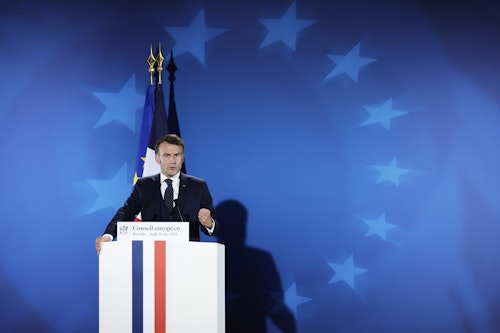
Photo credit: AP Photo/Omar Havana
'EU cannot remain passive' on Gaza, says António Costa
At the closing press conference, António Costa, the president of the European Council, spoke at large about the humanitarian catastrophe in the Gaza Strip, calling the situation "unacceptable" and "unbearable" and urging Israel to immediately accelerate the deliveries of emergency assistance.
"Nobody can ignore what we watch on TV and what we read in the press," Costa told reporters. "The humanitarian situation in Gaza is completely unacceptable."
Costa defended the review of the EU-Israel Association Agreement, which found "indications" that Israel had breached its human rights obligations in Gaza, and asked High Representative Kaja Kallas to come up with next steps when foreign affairs ministers meet again on 15 July.
"The report is very clear: there are systematic violations by Israel of human rights in Gaza," Costa said.
However, it's unlikely that any of those next steps will gather the necessary qualified majority, as member states remain sharply divided on how to respond to the review's critical findings. Costa admitted that different viewpoints are part of "the richness of our union" but stressed that the "EU cannot remain passive" on the grave situation inside Gaza.
"We have to call on Israel to do what needs to be done," he said.
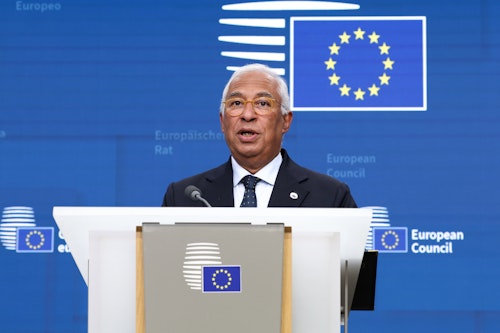
Friedrich Merz: Was this the summit that saw the rise of a new WTO?
German Chancellor Friedrich Merz briefed the press following his first EU Council summit. Here are the key takeaways:
Merz said he had been surprised at this summit to hear European Commission President Ursula von der Leyen tout the possibility of creating a new trade association that would replace the World Trade Organization, which he said was not functioning. It was an idea that Merz said he himself had previously discussed with French President Emmanuel Macron and UK Prime Minister Keir Starmer. “Couldn’t we institutionally replace what we had with the WTO, with what the WTO was meant to be?” Merz asked.
It is a plan at the very early stages of development, Merz stressed, describing it as a “rudimentary idea” at “the very beginning”, but “if the WTO is still not working then we have to come up with something else”, and he said that something else might emerge from the EU with its commitment to free trade and free markets, he said.
On the Mercosur deal, Merz said that minor issues over agriculture were flagged during the summit, but he said these related to minimal percentages of imports under the deal. He said Europe needs to conclude the deal quickly to demonstrate how quickly it is capable of moving on similar trade agreements.
Merz said he’d like to see a unanimous agreement on Mercosur, since one achieved by qualified majority would be a “second-best solution”. “I talked to Emmanuel Macron in the margins, and I had a feeling that there is great willingness to bring this, about I perceived no willingness for veto minority,” Merz said.
On the US trade deal, Merz said the Council encouraged the Commission to use the remaining two weeks to come to a swift agreement. But he said that the Council had encouraged von der Leyen to pursue the EU’s own countermeasures if necessary. Since it's two weeks there is not time to finish a very detailed agreement, Merz said. He said it was important to conclude something quickly and flagged the risks to the auto, chemicals and pharma sectors if 9 July arrives and the Trump tariffs take effect.
On Israel, Merz said that the Council had shared concerns about the humanitarian situation in Gaza, and considered how – with the US – the EU could exert pressure on Israel to bring about a ceasefire.
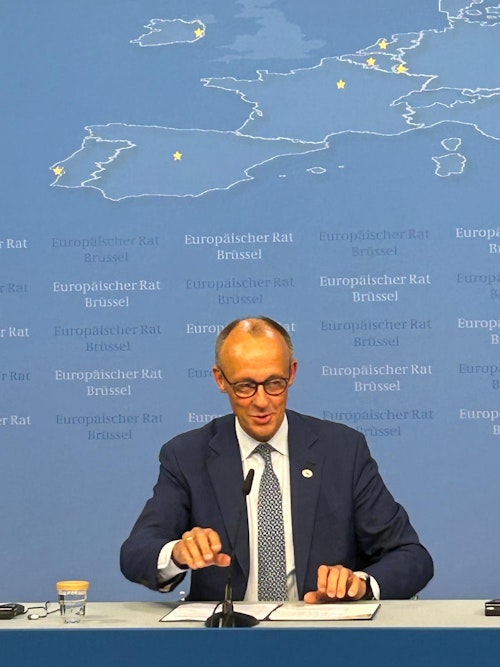
“I was welcomed in a friendly and collegial manner. I go back to Berlin with a good feeling,” said Merz.
Brussels has received new trade counterproposal from Washington
The European Commission has received a new counterproposal from the United States amid the ongoing trade negotiations between the two sides, says Ursula von der Leyen.
"We're assessing it as we speak right now," von der Leyen said at the end of the EU summit, without providing any details on the content. "Our message today is clear: we are ready for a deal."
Von der Leyen stressed that her Commission was "preparing" for the possibility that no satisfactory outcome would be reached and noted that "all options remain on the table".
EU leaders endorse rollover of Russia sanctions
The 27 leaders have endorsed the rollover of all sectoral sanctions imposed against Russia, including the freezing of sovereign assets, until January 2026.
The sanctions were up for renewal before 31 July, and there were fears that Hungary might threaten to derail the move as it did earlier this year. The experience with Hungary left officials and diplomats in Brussels rattled. That's why leaders decided to pre-empt the drama and provide a political agreement at the summit.
EU summit comes to an end
The meeting of the European Council has come to an end.
Leaders are making their way out of the room to address journalists.
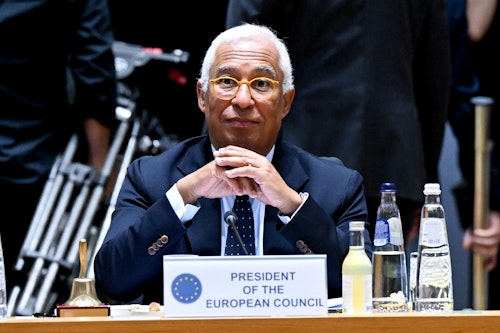
Will the summit end before or after midnight?
The EU summit is approaching the 12-hour duration, and weary journalists are wondering when it might end.
Diplomats and officials walking around the room feel the meeting could wrap up before midnight. However, the last item on the agenda, covering trade, climate and competitiveness, is so broad that all leaders appear inclined to take the floor and make a point. The more leaders speak, the longer the summit drags.
What's the (likely) outcome of EU-US trade talks?
According to diplomats familiar with the talks, the working assumption is that negotiators may ultimately settle on a 10% tariff, mirroring the arrangement the UK secured, when time for negotiations runs out on 9 July.
“But the European Union’s position on tariffs is fundamentally different from that of the United Kingdom,” one EU diplomat told us. Unlike the UK, the EU does not hold a comparable trade surplus with the United States, which significantly shifts the negotiation dynamics.
In practice, the EU already faces steeper trade barriers, the diplomat noted. The US currently maintains 25% tariffs on EU steel, aluminium, and key segments of the automotive sector.
Adding to the pressure is the looming threat of further tariffs on pharmaceuticals, timber, and certain metals, which could be triggered at any moment.
“If there is to be an agreement, the most realistic outcome would likely be a general framework or ‘principled agreement’, something close to the understandings the US has reached with the UK or even China,” the diplomat said, citing time constraints.
Some member states may be willing to accept a 10% tariff, but only on the condition that strategic goods are exempt from additional levies or that the deal includes compensatory measures in other sectors.
Von der Leyen makes presentation on EU-US trade talks
Ursula von der Leyen has taken the floor to make a presentation about the ongoing EU-US trade talks, launched in April after Donald Trump announced, and later paused, his self-styled "reciprocal tariffs".
Initially, Trump threatened the EU with a 20% tariff, but later raised the number to 50%, sending chills across European capitals.
The negotiations are being led by the European Commission, which has exclusive competence on trade policy, and operate under a deadline of 9 July. The White House, however, has indicated the deadline might be extended, given the lack of trade deals with other nations.
Still, member states are increasingly anxious about the prospect of being hit by across-the-board tariffs and are asking the Commission to speed up the talks. At the same time, officials warn that the EU shouldn't accept a deal for the sake of a deal, as the price to pay might be too high.
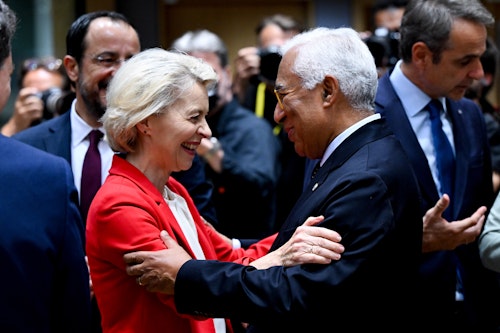
Diplomatic spat breaks out between Spain and Israel over Sanchez's summit comments
Spain's foreign ministry says it will summon a top Israeli diplomat due to what it described as "unacceptable comments" made in a statement earlier today by Israel's embassy in Spain.
That statement alleges Spanish Prime Minister Pedro Sanchez "demonised" Israel in comments made to reporters ahead of the EU summit in Brussels, when he called for the immediate suspension of the EU-Israel Association Agreement.
The blistering statement also accuses the Spanish government of "launching an anti-Israel crusade" and of being on the "wrong side of history".
Sanchez has been among the most vocal of EU leaders calling for a firmer response to Israel's war in Gaza, where more than 56,000 people are estimated to have been killed since the war broke out with Hamas' attacks on Israel in October 2023, according to the Hamas-run health ministry.
In virtual address, Zelenskyy calls for a $30 price cap on Russian oil
The office of Ukrainian President Volodymyr Zelenskyy has published the speech he delivered virtually to the 27 EU leaders in Brussels.
His message focused heavily on the need to urgently ramp up sanctions on Russia to cripple the war machine. Among other proposals, Zeleknskyy pitched a new price cap on Russian crude oil worth $30 per barrel, half of the current $60 value. The proposal is much lower than that recently put forward by the European Commission, which envisioned a new cap of $45 per barrel. (The project is considered essentially dead after the US refused to endorse the initiative at the G7 summit.)
"The facts are clear: for Russia's appetite for war to shrink, its oil revenues must shrink. So, please support further steps to lower the price cap on Russian oil. A cap of $45 could help move toward peace, of course," he said. "But for real, lasting peace – and we shared it yesterday with all the partners: European partners, US partners – a cap of $30 per barrel is needed to block Russia’s ability to fund its aggression."
Besides sanctions, Zelenskyy emphasised the importance of advancing Ukraine's EU accession, which remains single-handedly blocked by Hungary. Earlier on Thursday, Prime Minister Viktor Orban presented the results of his controversial national consultation, showing that 95% of the 2.2 million participants had voted against Ukraine's candidacy. (Hungary has a population of more than nine million people.)
"What's needed now is a clear political message – that Ukraine is firmly on the European path, and that Europe stands by its promises. Any delay by Europe at this point could create a global precedent – a reason to doubt Europe's words and commitments," Zelenskyy told leaders.
"We are doing our part. It's fair to expect a positive response. So opening Cluster One 'Fundamentals' in the negotiation process could be more than just a technical step. It would be a political decision that defines Ukraine's future integration with Europe. Please support this. And we are working to be ready on all clusters this year."
The blockage on Ukraine's accession is so entrenched that officials in Brussels are seriously contemplating the idea of decoupling Ukraine and Moldova to allow the latter to advance in the process.
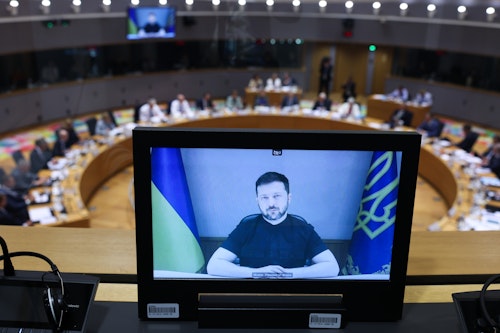
Fico's veto casts shadow over end of Polish presidency
When Poland assumed the rotating presidency of the Council of the EU on 1 July, two of its most pressing priorities were to step up support for Ukraine and increase pressure on Russia.
During its presidency, the country managed to advance two packages of sanctions, mostly focused on Russia's "shadow fleet". The first one was sealed in February and the second in May. Polish officials were increasingly confident they could have a third one under the belt before the end of the presidency on 31 June. The package currently on the table, which targets Russia's financial and energy sector, is considered much harder-hitting than the previous two. But Robert Fico's decision to maintain his veto makes it virtually impossible for Poland to achieve this goal as things stand right now.
The hard work will be passed on to Denmark, which takes over the rotating presidency on 1 July.
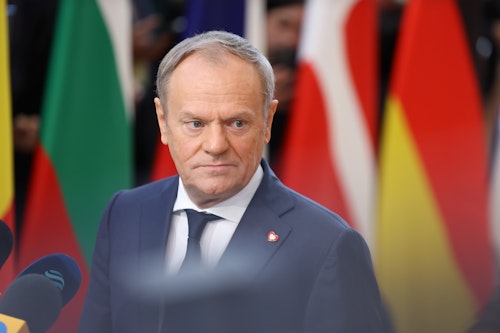
EUCO trivia time: What’s for dinner (and what’s the damage)?
Dinner is being served a little bit later than usual at the European Council, as the competitiveness part dragged on. But now EU leaders can finally sink their teeth into the usual three-course meal supposed to facilitate the remaining talks of the evening.
But ever wondered how much it costs to feed 27 heads of state without triggering a budget crisis? An EU source tells us: €92 per person.
.
Not exactly a steal, but still cheaper than a tasting menu in a two-Michelin-starred restaurant and pricier than your corner kebab combo.
The menus? Designed by the Council’s general secretariat, focusing on seasonality, nutritional balance, and presumably avoiding anything too saucy before a late-night press conference.
For instance, tonight EU leaders are having dumplings filled with smoked cottage cheese with cherry syrup for starter; duck leg confit and potato purée with horseradish for main course; and strawberry cheesecake as dessert.
As for the seating, it’s all in the hands of the Protocol Service (yes, someone’s actual job is making sure Ursula von der Leyen and Viktor Orbán don’t end up next to each other by accident).
EU leaders discuss competitiveness
EU leaders have wrapped up their discussion on Ukraine and are now occupied with the topic of competitiveness. Or rather, how to ensure the EU doesn't lose more of its competitiveness.
The thematic segment is expected to include the EU-US trade talks, which the European Commission is leading under a deadline of 9 July, and the 2040 climate target, which some member states see with suspicion. Under EU law, the Commission is obliged to present a 2040 target.
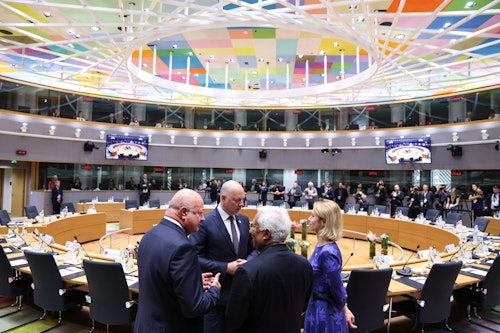
Here are the sanctions that Fico is vetoing
Slovakia's Prime Minister Robert Fico has confirmed his intention to maintain a veto on the next round of EU sanctions against Russia over an unrelated energy dispute.
The proposed package targets:
- 22 Russian banks
- 77 vessels from Russia's "shadow fleet"
- The Nord Stream pipelines, which are currently non-operational
It also proposes to lower the price cap on Russian crude oil from $60 to $45 per barrel, but this element is considered essentially dead after the US refused to endorse the revision at the G7 summit last week. (Unlike other sanctions, the price cap was established at the level of the G7 and requires wider coordination.)
EU proposes fresh sanctions on Russia’s oil, banks and Nord Stream
The latest proposal of EU sanctions comes ahead of a summit of G7 leaders, where the revision of the price cap on Russian oil will be high on the agenda. #Euro…
Why did Fico veto the new sanctions on Russia? We take a closer look
We've taken a closer look at Robert Fico's video message, which he recorded during a break in the EU summit, to understand his decision to block the next package of EU sanctions against Russia.
It must be noted that Fico's opposition relates to an entirely separate matter: the European Commission's proposed roadmap to phase out all Russian fossil fuels, including gas and oil, by the end of 2027. Slovakia is a landlocked country that is still reliant on Moscow for energy. According to Fico, doing away with these purchases could have catastrophic consequences for the Slovak economy.
He essentially asks Brussels for money to deal with:
- A potential lawsuit from Gazprom, Russia's gas monopoly: Gazprom operates take-or-pay contracts that require clients to pay compensation in case of sudden termination. Fico estimates the lawsuit against Slovakia could be worth "€16 to €20 billion". The Commission, however, argues that the proposed bans would act as "force majeure" to avoid damages in court.
- Transit fees: Fico says that if Slovakia buys more gas from non-Russian suppliers, it will have to spend more money on transit fees. Therefore, he demands guarantees that these other countries will charge the same fee as Russia does now.
- Consumer prices: Fico says the end of low-cost Russian gas, paired with higher transit fees, will push gas prices "by 30 to 50 percent" and strain families. "We will need to find the funds to compensate Slovak households and industry, as neither will be able to cope with this burden," he said in his video message. Energy poverty is worse in Slovakia than in neighbouring countries of Central Europe.
Fico said he would continue "constructive negotiations" with the European Commission to solve the dispute, with a special mission scheduled to take place in Slovakia "next week". However, it's unclear how Brussels will be able to come up with the eye-popping financial numbers that Fico appears to have in mind.
Here's what the phase-out is about.
EU sets 2027 as deadline to phase out all Russian fuels, including LNG
Imports of Russian oil, gas and nuclear materials must stop by 2027 at the very latest, Brussels has proposed in a new ambitious strategy. #EuropeNews
What the Ukraine conclusions say
The conclusions on Ukraine that were "firmly supported" by 26 member states reiterate the EU's support for a "comprehensive, just and lasting peace in Ukraine", and for the country's "independence, sovereignty and territorial integrity".
It also calls on member states to step up efforts to address Ukraine's pressing military and defence needs, and to stand ready to "increase pressure" on Russia "including with a new robust package of sanctions including ways in which Russia’s energy revenues could be further targeted."
Slovakia's endorsement of this latter part stands in sharp contrast to its decision, announced shortly after 18:00 CET that it would maintain its veto on the 18th package of EU sanctions against Russia over a EUropean Cpmmission proposal to phase out imports of Russian fossil fuels, which the country continues to buy.
The 26 member states also invited the Council "to take the next steps in the accession process" with "clusters being opened when the conditions are met". Leaders also took "good note of the assessment of the Commission that the fundamentals cluster is ready to be opened.
Hungarian leader Viktor Orban on Thursday came to the summit with the result of vote in which two million Hungarian respondents said they opposed Ukraine's accession to the EU. Orban has resorted to these types of plebiscites several times before which have been criticised for containing biased questions and for the way they are carried out.
Orban has also in the past demanded guarantees over the treatment of the Hungarian minority in Ukraine.
Hungary blocks unanimous conclusions on Ukraine
Leaders have finished their discussions on Ukraine but the conclusions were endorsed by 26 of the 27 leaders only.
Hungary already blocked unanimous conclusions on Ukraine in March.
Budapest is also blocking progress on Ukraine's accession path. The European Commission has said the war-torn country has fulfilled all the conditions to open negotiations for the first cluster of chapters on fundamentals, but opening the talks requires the unanimous backing of all the member states.
Slovakia's Robert Fico maintains veto on Russia sanctions
Slovakia's Prime Minister Robert Fico has just announced his country would maintain the veto on the 18th package of EU sanctions against Russia over a separate disagreement with the European Commission related to the phase-out of Russian fossil fuels, which his country continues to buy.
The Commission proposed in May an ambitious roadmap to eliminate all imports of Russian fossil fuels, including oil and gas, by the end of 2027. Slovakia immediately criticised the proposal, arguing it will lead to higher consumer prices, weaken competitiveness and endanger energy security.
But because the proposal is meant to advance under qualified majority, Slovakia and Hungary, two landlocked countries that remain dependent on Russian energy, have failed to stop its progress. Instead, the duo has resorted to the sanctions, which require unanimity, as a means to extract concessions.
"The reason is that the legislative act halting gas flows as of January 1, 2028, is, in our view, a sanction with far-reaching consequences," Fico said in a video message posted on his Facebook account just 30 minutes ago.
"Therefore, this issue must be resolved first—let’s define the solution, and only then can we discuss further sanctions packages. If our proposal to postpone the vote is not accommodated, the Slovak ambassador will receive a clear instruction to veto the adoption of the 18th sanctions package."
In his statement, Fico calls for solutions to deal with a potential lawsuit from Gazprom, Russia's gas monopoly, which operates long-term contracts with take-or-pay terms. He said he discussed the issue earlier on Thursday during a bilateral meeting with Ursula von der Leyen.
"Gazprom will have legal grounds to sue Slovakia, and the potential cost of this lawsuit is estimated to be between 16 and 20 billion euros," Fico says.
"So we asked the Commission President: if we lose such a legal dispute, who will pay the 16 to 20 billion euros we would owe the Russian Federation and Gazprom? Of course, these are questions the European Commission does not yet have answers to."
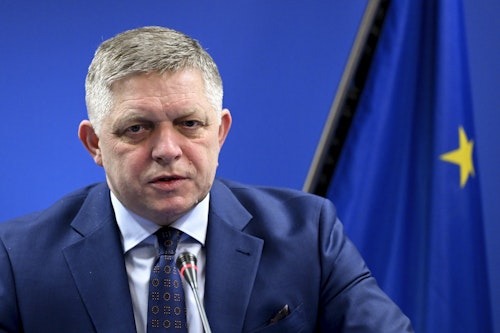
Video call with Zelenskyy over
The video call with President Zelenskyy has come to an end.
Leaders are now discussing Russia's war on Ukraine. The conclusions on the matter are expected to be endorsed by only 26 member states due to the opposition of Hungary, which considers the bloc's policy to be "pro-war". This 26-only practice began in March and has continued since then.
Zelenskyy now addressing EU leaders
Ukrainian President Volodymyr Zelenskyy is currently addressing the EU leaders by video conference.
Zelenskyy has had a busy week of travelling. He was in London on Monday for a meeting with Prime Minister Keir Starmer, then in The Hague on Tuesday and Wednesday afternoon for the NATO summit, before jetting over to Strasbourg last night to sign an agreement with the Council of Europe to establish a special tribunal to prosecute the crime of aggression.
Leaders delay next steps on EU-Israel review
As widely expected, the 27 leaders have delayed taking specific action on the EU-Israel Association Agreement after an internal review found "indications" that Israel had breached its human rights obligations in the Gaza Strip and the West Bank.
The final text of the conclusions reads: "The European Council takes note of the report on Israel’s compliance with Article 2 of the EU-Israel Association Agreement and invites the Council to continue discussions on a follow-up, as appropriate, in July 2025, taking into account the evolution of the situation on the ground."
Despite the findings of the review, leaders remain sharply divided on how to deal with Israel. Some countries, like Spain, Ireland and Slovenia, are asking for "real pressure" on Israel, even threatening to mount a coalition of the willing if the 27 fail to act as one.
Other countries, like Germany, Italy and Hungary, are opposed to taking further steps, having opposed the launching of the review in the first place.
There's a third group of countries that are in between and insist the focus should be on engaging with Israel and addressing the humanitarian needs on the ground as soon as possible, starting with the flow of emergency aid. Diplomats have said they would like to see High Representative Kaja Kallas travel to Israel and discuss the matter face-to-face with the government of Benjamin Netanyahu.
The fractures are expected to re-emerge when foreign affairs ministers meet again on 15 July. Kallas is expected to present possible options during that meeting, even if no option is likely to gather the necessary qualified majority to move forward.
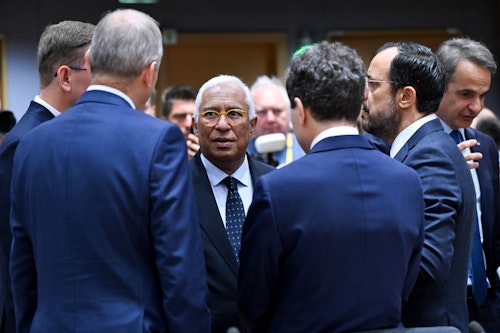
Cyprus leader: On Gaza, leaders focused on 'humanitarian tragedy'
On the situation in Gaza, leaders mainly discussed which actions the EU could take to boost access of humanitarian aid into the devastated enclave, Nikos Christodoulides told several reporters including Euronews' Maria Psara.
The Cyprus President described the situation there as a "humanitarian tragedy".
Leaders said they hoped it could be achieved "in the near future", Christodoulides added, and strengthen the bloc's role in the region.
Middle East debate ends
EU leaders have concluded their debate on the Middle East.
The conclusions should be published soon.
Euronews takes you to its liveblog backstage 📹
Hundreds of journalists from all over the world are gathered in a large glass cube following the latest development in the Council.
Our journalist Romane Armangau gives you a sneak peak of the venue!
EU keen to reinforce the 'global role of the euro'
EU leaders are also expected to discuss economic developments.
According to the latest draft conclusions, the Council will urge the Commission and the European Central Bank to continue their efforts to reinforce the international role of the euro, including its use as a reserve and transaction currency.
Euronews' Piero Cingari reports that the single currency has rallied 13% this year, buoyed by eurozone fiscal policy shifts, political uncertainty in the US, and changing market dynamics.
You can read the whole story here:
Euro heads to 4-year highs: Could it reach 1.20 or higher?
The single currency has rallied 13% this year, buoyed by eurozone fiscal policy shifts, political uncertainty in the US, and changing market dynamics.
Middle East debate takes place without devices
Don't expect too many leaks about the debate on the Middle East: the hot-button discussion is taking place without electronic devices in the room.
Stay tuned for the final version of the conclusions.
Kallas briefs leaders about EU-Israel review
Kaja Kallas has briefed leaders about the review of the EU-Israel Association Agreement, which concluded there are "indications" that Israel has breached the human rights obligations enshrined in Article 2.
The review was launched last month after a majority of 17 member states, led by the Netherlands, asked for it. Germany and Italy were among those who opposed the exercise.
Building upon the work of international organisations, the review provides an extensive list of violations, including the blockade of humanitarian assistance, military attacks against hospitals, the forced displacement of the Palestinian population, mass arrests, arbitrary detentions and violent acts committed by Israeli settlers in the West Bank.
The violations are described as numerous and serious in nature.
Despite the strong wording, the review is unlikely to sway minds, as member states continue to be sharply divided on how to address Israel's war on Gaza and the humanitarian catastrophe.
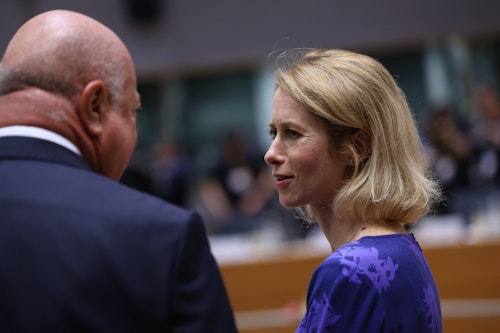
Leaders ask Commission to draw up roadmap for common defence readiness by 2030
The conclusions on defence have been released.
Leaders reiterate that the union "must become more sovereign, more responsible for its own defence and better equipped to act and deal autonomously" and that "work on capabilities in the priority areas identified at EU level must be accelerated, in full coherence with NATO".
The leaders have tasked the European Commission and the High Representative, Kaja Kallas, to "present further proposals to strengthen military mobility", which the EU executive expects to do in the autumn.
They have also asked for a "roadmap" towards reaching the objective of common defence readiness by 2030.
Reminder: The Commission has put forward a programme that it says can see up to €800 billion poured into the sector over the next four years in order to boost the production and deployment of military equipment around the bloc before the end of the decade.
EU leaders start lunch with a focus on Middle East
EU leaders have concluded their discussions on security and defence, which appeared to flow easily given that most of them have just arrived from the NATO summit in the Hague.
Now, the 27 heads of state and government will have lunch while they debate a much more divisive matter: the Middle East.
Although the review of the EU-Israel Association Agreement has provided "indications" that Israel breached its human rights obligations in Gaza, leaders are unlikely to agree on next steps due to the vast divergences around the room. Some countries, like Spain and Ireland, want to proceed with a suspension of the agreement. Others, like Germany and Hungary, don't want to.
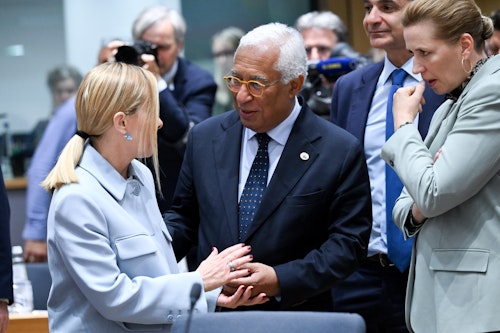
We’ll convince Hungary’ on EU accession, says Ukrainian ambassador
Ukraine is confident that it will eventually be able to overcome Hungarian resistance to its path to EU accession, the head of the country's Mission to the EU told Euronews’ morning show Europe Today on Thursday.
Vselovod Chentsov came into our studio in Brussels for an exclusive interview as the bloc's leaders gather in Brussels for another critical summit, with Ukrainian EU accession one of the agenda items.
“We’re fighting to stop this war first of all, and we’re fighting for our European future. Ukraine is a candidate state, and we’re ready to start accession talks as soon as there is consensus,” Chentsov said.
Check the whole story here:
‘We’ll convince Hungary’ on EU accession, Ukraine ambassador says
Ukraine’s EU ambassador joined Euronews’ Europe Today for an exclusive interview ahead of the 27-member bloc’s summit on Thursday. #EuropeNews
Lavrov: NATO’s new 5% defence spending won't 'significantly' impact Russia’s security
On Thursday, Russia’s Foreign Minister, Sergei Lavrov, said that NATO’s new 5% defence spending would not be “significant” for Russia’s security, Reuters reports.
"We know what goals we are pursuing, we don't hide them, we openly announce them, they are absolutely legal from the point of view of any interpretation of the principles of the UN Charter and international law, and we know by what means we will always ensure these goals," Lavrov said.
Following Russia’s military aggression against Ukraine, the US has urged its 31 NATO allies to increase their defence spending and take on a greater share of the burden within the alliance as US interests shift towards the Indo-Pacific.
On Wednesday, NATO allies agreed to increase their defence spending targets from 2% to 5% of GDP by 2035. Meanwhile, Russia has transformed its economy into a war economy, allocating over 40% of the 2025 budget to defence and security.
Brussels to host Global Coalition Against Smuggling of Migrants Summit on 10 December
Ursula von der Leyen confirmed during the pre-summit meeting on migration that Brussels will host a summit for the Global Coalition Against Smuggling of Migrants on 10 December, the Italian Prime Minister's office said.
According to the Palazzo Chigi, von der Leyen also updated the leaders present at the meeting on the main strands of the Commission's work in the field of migration, and in particular on the ongoing negotiations over the "Return Directive".
The proposed regulation plans for the controversial establishment of return hubs in third countries, the expansion of the list of third countries foreign nationals can be returned to against their will beyond their country of origin, the introduction of a new “European Return Order” and the mutual recognition of return decisions by member states, and the expansion of the grounds for detention.
The countries attending the meeting expressed "satisfaction with the results achieved so far", the statement from Palazzo Chigi said.
Latvian PM urges extra pressure on Russia
Latvian Prime Minister Evika Siliņa has called for extra pressure on Russia to weaken its war machine.
"We're very committed to further sanctions against Russia and Belarus," she said upon arrival at the summit. "For us, it's very important to keep Russia from financial resources."
Member states are currently negotiating an 18th package of sanctions targeting Russia's financial and energy sectors. A proposed revision of the price cap on Russian oil is, however, unlikely to be approved due to the lack of support from the United States.
Asked if Russia would agree to a ceasefire in Ukraine, Siliņa said that Moscow was "demonstrating only force" with its relentless bombing against civilians. "We call for a ceasefire, but if no ceasefire is reached, we need to go further with the next package of sanctions," she said. "We need to show our political will."
Austrumu robežas stiprināšana ir viena no manām prioritātēm sarunās ar Eiropas līderiem Briselē. Kopā ar Igauniju, Lietuvu un Poliju jau vērsāmies ar kopīgu vēstuli, lai risinātu drošības izaicinājumus uz mūsu ārējām robežām.
— Evika Siliņa 🇱🇻🇺🇦 (@EvikaSilina) June 26, 2025
Eiropadomes dienaskārtībā arī NATO samitā pieņemtie… pic.twitter.com/7z2vS12iTu
New Romanian president makes EU summit debut
The new president of Romania, Nicușor Dan, has made his first appearance at the European Council, reassuring other member states that his country will stay the course of European integration.
Dan, an independent, pro-EU politician, won a closely watched, fiercely contested race in May against hard-right candidate George Simion. The results were a huge relief for Brussels, given Romania's strategic position in the bloc's Eastern flank.
After arriving at the summit, Dan posted two messages on social media, one with European Council President António Costa and another with European Commission President Ursula von der Leyen.
In Brussels, at my first #EUCO as President of Romania. On Romania’s requests, the European Council will reaffirm EU’s support for Republic of Moldova ahead of EU-R. Moldova summit and will welcome the adoption the #EU Black Sea Strategy. On European security and defense,… pic.twitter.com/z3yrl1d9Pg
— Nicușor Dan (@NicusorDanRO) June 26, 2025
Metsola: All options on the table over Commission's SAFE procedure
The President of the European Parliament said she is keeping all options on the table after the legal affairs committee (JURI) voted to take the Commission to court over its decision to bypass MEPs to set up a €150 billion defence loan scheme, called SAFE.
"My job is to stand up for the European Parliament," Roberta Metsola said.
"We think that the use of Article 122 for SAFE as a legal basis was unnecessary," she told reporters after meeting with the leaders, because there is "wide support in the Parliament" for the initiative.
"We have no issue with the content, in fact we like it," she said.
JURI confirmed its earlier recommendation to take the Commission to court in a vote on Tuesday. The committee considers that Article 122, which allows the Commission to submit a proposal to member states only in case of emergency, does not apply here.
The Commission, which previously successfully invoked Article 122 during the COVID pandemic and the energy crisis, rejects that analysis. Member states approved the regulation late last month and are expected to submit their requests for funding before the end of July.
Metsola affirmed to reporters that this is "not an interinstitutional fight" but about "democratic legitimacy".
"We will examine all the options calmy, pragmatically," she said, warning: "We will not take any options off the table".
Read more on SAFE below:
Everything you need to know about the EU’s €150bn defence instrument
European Council President Antonio Costa said the adoption by ambassadors is “an important step toward a stronger Europe”. #EuropeNews
Top MEP: The next EU’s long-term budget must ‘defend’ the European social model
Iratxe Garcia Perez, the S&D group leader in the European Parliament, said that the next EU long-term budget (2028-34), also known as the Multiannual Financial Framework (MFF), must defend the European social model.
Speaking ahead of a meeting of European socialists and democrats in Brussels earlier on Thursday, she said: “It’s very important for our political family to guarantee that we will continue defending a strong budget for traditional policies and new challenges.”
The top MEP also stressed the need to continue working on proposals for the so-called 'new own resources', which could increase the upcoming budget beyond the current €1.2 trillion ceiling (2021–27).
'To come back to austerity is not an option for us socialists,' said Garcia-Perez.
Why Orbán and Fico have teamed up once again
Hungary's Viktor Orbán was spotted speaking with Slovakia's Robert Fico just minutes before the EU summit began. The reason for their camaraderie lies in their joint opposition to the European Commission's proposed phase-out of Russian fossil fuels, which both landlocked countries continue to buy.
Orbán and Fico have threatened to veto the 18th package of EU sanctions on Russia if their concerns regarding the phase-out are not addressed. Slovakia, in particular, has asked for "guarantees", which some in Brussels interpret as either a request for money or legal exemption, or perhaps both. Earlier today, Fico held a bilateral meeting with Ursula von der Leyen to discuss the matter, a diplomat told Euronews.
The Commission is confident it can arrive at a compromise of sorts without imperilling the essence of the energy strategy. If things are smoothed out, EU ambassadors will be able to formally adopt the sanctions on Friday.
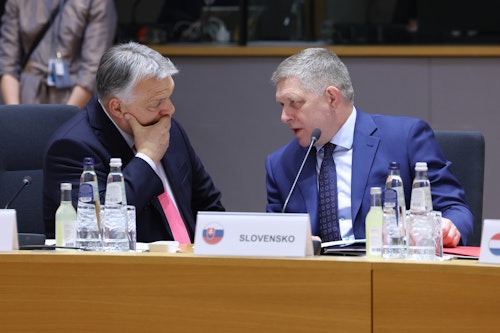
Germany joins pre-summit meeting on migration
Friedrich Merz this morning joined the now traditional pre-summit meeting on migration.
Czech Prime Minister Petr Fiala said he is "pleased" with the new addition around the table. The leaders of Austria, Belgium, Bulgaria, Cyprus, Denmark, Hungary, Italy, Greece, Malta, the Netherlands, and Sweden also took part.
"Our so-called Migration Group meets regularly to prepare proposals aimed at tightening the rules, so we can better tackle illegal migration. Several of our proposals have already been taken up by the European Commission, which then introduced corresponding legislative changes," Fiala said on X.
An important meeting on migration ahead of the European Council. 🇪🇺
— Petr Fiala (@P_Fiala) June 26, 2025
I am pleased that Germany has newly joined our initiative. Our so-called Migration Group meets regularly to prepare proposals aimed at tightening the rules, so we can better tackle illegal migration.
Several of… pic.twitter.com/l2Jpdm9ADI
Emmanuel Macron not yet around the table
The summit has officially started but there's one notable absence: French President Emmanuel Macron.
Euronews has reached out to the Elysée to find out why, but no word as of yet.
Macron, like 22 of his EU counterparts, was in The Hague yesterday for the NATO summit.
'More action, less talking' on support to Ukraine and defence, nine member states urge
The leaders of Denmark, Estonia, Finland, Latvia, Lithuania, Sweden - known as the Nordic-Baltic 6 - met with their counterparts from Ireland, Poland, and Germany before the summit with discussions focusing primarily on support to Ukraine.
"The countries around this table are some of the leaders in supporting Ukraine and increased spending in our own security. We call on all member states to do more and to do it faster," Swedish Prime Minister Ulf Kristersson said.
"If we are serious about the Russian threat being existential, we cannot afford to not strengthen our own defence capabilities, and in parallel strengthen Ukraine. More action, less talking.
"And if we are to afford increasing our own security, in parallel with several other challenges such as welfare and climate, we need a growing economy. We will keep pushing the Commission to make it easier to do business in Europe," he added.
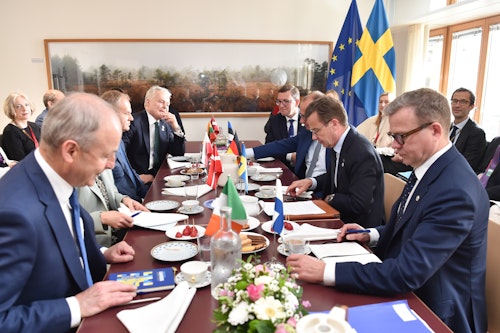
Photo credit: European Council
EU summit begins
The meeting of the European Council has officially begun.
Stay tuned for more updates on our blog.
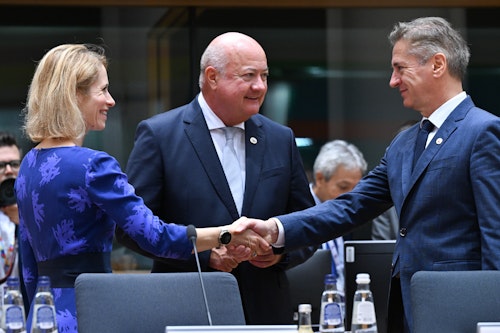
The EU has to 'immediately' suspend the Association Agreement with Israel, says Sanchez
The European Union has to “immediately” suspend its association agreement with Israel, Spain’s Prime Minister Pedro Sanchez said.
“It makes no sense that we have imposed seventeen rounds of sanctions on Russia for its aggression against Ukraine, yet Europe, applying double standards, is unable to even suspend an association agreement when Israel is flagrantly violating Article 2 on respect for human rights,” Sanchez said.
Last week, the EU’s top diplomat Kaja Kallas presented an eight-page review of the bloc’s association agreement with Israel, which concluded that there were “indications” that Israel would be in breach of its human rights obligations under Article 2 of the partnership.
Kallas stressed that if Israel doesn’t “improve the situation” in Gaza, the EU will discuss “further measures” on how to suspend the agreement – but for countries like Spain, that’s not enough action to respond to the “catastrophic” situation happening in Gaza.
Sanchez also argued that there is “no alternative” to the two-state solution for the conflict in Gaza.
“There is no other alternative if we want to get to the root of the conflict and find a solution to it,” he concluded.
EU will revisit suspending partnership deal with Israel over Gaza
The EU’s 27 foreign affairs ministers were expected to respond to a recent review of the EU-Israel Association Agreement which found “indications” that Israel…
Lithuania’s Nausėda praises Trump, calls for ambitious Ukraine EU accession target
Lithuanian President Gitanas Nausėda praised US President Donald Trump for pushing NATO allies to raise defence spending, as EU leaders gathered in Brussels. “President Donald Trump, as I’ve mentioned many times, has sufficient leverage in his hand,” Nausėda said. “Yesterday’s leadership by the American president in NATO – with us ready to take the decision on 5% [of GDP] – I could not have imagined such a percentage two years ago. But now this is a reality, and it’s thanks to the American president.”
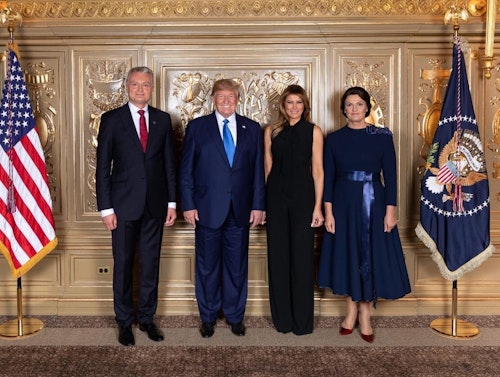
Turning to Ukraine, Nausėda said time for discussion was over and urged the EU to act decisively. “Right now, I’m not very optimistic and I don’t see the light at the end of the tunnel,” he said. “Russia is unwilling to proceed. It’s pretending, imitating negotiations. A ceasefire is a necessary precondition for peace – and that’s not the case.”
He backed the EU’s 18th package of sanctions against Russia, calling it “good, strong and sufficient” – but warned against weakening it with exemptions. “Our response should be clear and strong,” he stressed.
Nausėda also renewed his call for Ukraine’s future within the European Union. “It is productive to set an ambitious political target – for example, to see Ukraine as a member of the EU on 1 January 2030,” he said. He urged the European Commission to push ahead with accession talks, despite ongoing political hurdles, warning that delays weaken the EU. “One country cannot misuse the instrument of consensus,” he said. “If we waste time, we cannot take bold decisions.”
Mitsotakis: We need to discuss 'missing link' in EU's migration policy
Prime Minister Kyriakos Mitsotakis said that the focus for Greece during the migration discussions will be on "making sure we implement a new policy regarding returns".
He said that it's the "missing link" in the EU's migration policy.
He also said he will also raise "problems we’re having with Libya". "They need to cooperate with European countries and European Commission in order for the boats managed by smugglers not to leave the Libyan coast."
The latest draft of conclusions - the document leaders co-sign at the end of the summit - seen by Euronews says that they addressed the "worrying situation in Libya" and "its possible consequences also in terms of European security, as well as concerning migratory flows".
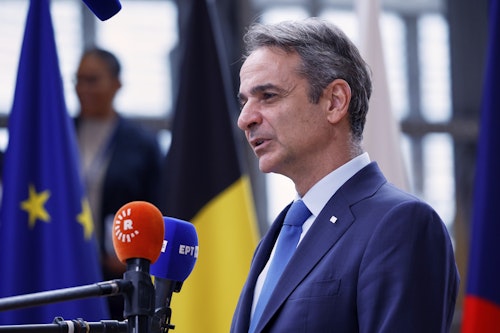
Photo credit: AP
EU summit agenda has changed
We've just heard about an important change in the EU summit's agenda.
The new running order will be:
- Exchange of views with Roberta Metsola, the president of the European Parliament
- Security and defence (morning)
- Middle East (lunch)
- Ukraine, including a video conference with President Volodymyr Zelenskyy (afternoon)
- EU in the world and competitiveness (dinner)
Initially, Ukraine was supposed to be the second item after the exchange of views with Metsola. But Zelenskyy was unable to join the meeting virtually in the morning, prompting the change, an EU official explained.
'You are acting for Israel!' Left MEP tells EPP counterpart in Euronews's Morning Show debate
Belgian Left MEP Marc Botenga lashed out against the conservative European People’s Party for defending Israel and the EU’s association agreement with Tel Aviv on Euronews’s Morning Show on Thursday.
“You are acting for Israel!,” Botenga told Austrian EPP MEP Lukas Mandl.
“You are not acting for the EU interests… What you are doing is defending the speaking point of the Israeli embassy against the international courts…you are outside international legality right now.”
While Botenga insisted the EU had to suspend the association agreement because Israel was committing “crimes against humanity” in Gaza, Mandl said there were “positive developments” on the ground in Gaza and “the EU would go in the very wrong direction” if it suspended its trade ties with Israel.
“The problem for Gaza is not Israel, the problem for Gaza is Hamas,” Mandl added referring to the armed Palestinian group. The debate was aired prior to the European Council, where leaders are expected to discuss the next steps following their review of the bloc's association agreement with Israel.
Last week, the review of the EU-Israel Association Agreement found "indications" that Israel breached its human rights obligations with actions in Gaza.
Metsola: 'We need to do our homework' on defence
The President of the European Parliament said the outcome of the NATO summit held on Wednesday in The Hague is "very good".
The 32 allies of the military alliance - which include 23 EU member states - agreed to raise the defence spending target from its current 2% of GDP level to 5%.
Roberta Metsola said that the EU now "need(s) to get our house in order. We need to do our homework".
She said she is "very happy" that the trilogue on defence procurement will start next week, and that she hopes that the simplification package the Commission proposed last week for the defence sector can be finalised "by the end of the year.
Read more on the simplification drive for defence below:
The EU seeks to slash red tape for defence as money ‘is not enough’
The EU is racing to adapt its defence posture to the threat posed by Russia amid uncertainty over Washington’s continued military support. #EuropeNews
Luxembourg’s PM: Let’s spend more on defence, but don’t cut social policies
Europe will spend more on defence but that increase in public spending cannot come at the expense of other important priorities, Luxembourgish Prime Minister Luc Frieden said ahead of the June EU summit in Brussels.
“We need to spend a little bit more money, but it should not be at the expense of other necessary expenditures for social policies, for infrastructures,” Frieden stressed. “All this needs to go hand in hand, but without security, there is no freedom.”
Luxembourg’s PM also called on his counterparts and the Commission to move forward on trade.
“We need open trade. We are against tariffs, so I hope that the discussions with the US will continue in an energetic mood in the coming days because the July 9th deadline is coming fast,” Frieden added.
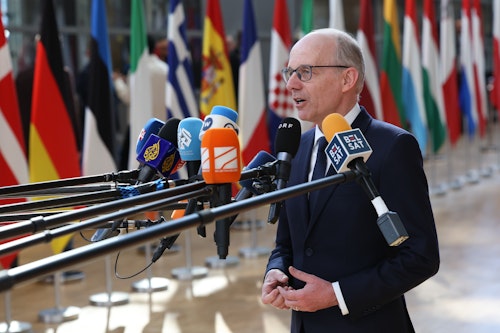
Source: European Union
Belgian PM backs stricter migration rules, calm response to Trump, and full support for Ukraine
Arriving at the European Council summit, Belgian Prime Minister Bart De Wever voiced support for a tougher EU stance on migration.
“There is a group of countries that believe immigration policy must be much stricter,” he said, adding that he welcomed Germany’s alignment with this position for the first time.
“It’s a pressure group to tighten migration rules – which is necessary in my view,” he added, noting that CDU leader Friedrich Merz would be part of the meeting.
On growing trade tensions with the United States, De Wever backed Commission President Ursula von der Leyen’s response to Donald Trump’s tariff threats.
“We support her reaction to the threat of a trade war. We stay calm, we do not let ourselves be provoked, and we negotiate,” he said. “We hope for an agreement, but if that’s not possible, we will adopt appropriate countermeasures.”
When it comes to Ukraine, the Belgian leader said Europe must show it still stands firmly behind Kyiv.
“It is regrettable that Ukraine is present at the NATO summit but not at the table,” he said. “Today, Europe must show that we are still 100% behind Ukraine. The 26 member states – excluding Hungary, which is not pro-Ukraine – support Ukraine and its people, who are fighting for our freedom.”
De Wever also expressed optimism about adopting EU sanctions against Russia. “I hope we can reach consensus. I’m very optimistic,” he said. “We are adopting an 18th package of sanctions to fully move away from Russian fossil fuels.”
Speaking more broadly about Europe’s role in the Ukraine conflict, De Wever warned of Europe’s continued military dependence on the US.
“We’re not excluded from the table, but it’s clear we don’t share the same views anymore. It’s a lesson for Europe – we need to become strategically stronger. Peace requires strength, and Europe doesn’t yet have the capacity to replace the Americans on the ground. We hope to keep them on board.”
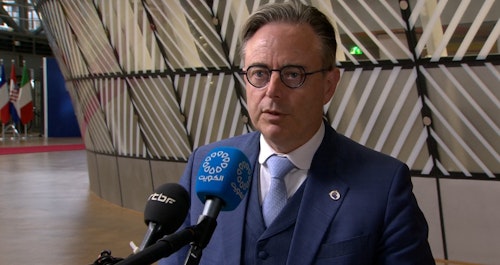
Slovenian PM: If the EU doesn't act on Gaza, some countries will move on their own
Slovenian Prime Minister Robert Golob has warned that unless the EU as a whole agrees to put "real pressure" on Israel to alleviate the suffering in Gaza, a coalition of member states will move on their own.
"It's been for some time that the EU as a whole cannot preach the rule of law due to the inadequate response to the atrocities happening in Gaza," Golob told reporters upon arrival. "We should do much more than in the past, but it's never too late."
Golob cited the recent review of the EU-Israel Association Agreement, which found "indications" of human rights violations in the Gaza Strip and the West Bank, as the basis for the discussion on Thursday. He then criticised member states who are reluctant to follow up on the findings. Germany and Italy are among those who voted against launching the review in the first place.
"Unfortunately, some of the member states, important member states, decided to give first priority to their own interests and not to the human rights of the Palestinian people. We'll see whether we'll be able to persuade them, but if not, we will persist, Golob said.
"Unless the European Union is going to do something tangible either today or in a matter of two weeks, then each member state, including Slovenia, and some of the like-minded countries, we will have to do the next steps on our own and we're ready to do that," the PM went on. "Because it's high time that we do show not just solidarity, but we put some real pressure on the Israeli government."
Last year, Slovenia recognised the State of Palestine and established diplomatic relations.
Martin: ‘Carnage’ in Gaza ‘cries out for a strong political response’ from the EU
Micheál Martin said that the "degree of carnage and destruction" as well as "death and injury to children" in Gaza requires "strong" humanitarian and political responses from the EU.
The Irish Taoiseach said he finds it "incomprehensible" that Europe cannot find a way "to pressure Israel to stop this war in Gaza".
He urged Israel to "stop denouncing every report that comes out using objective criteria to describe the situation in Gaza", including the review of the EU-Israel Association Agreement that the EU's external service that foreign affairs ministers discussed last week.
Ireland and Spain had been calling for the review for over a year.
Martin said of the review is "a modest document that seeks to objectively present the fact" and that "avoids emotional language".
Israel "should respect" the agreement and its human rights clause.
Read more on the review below
EU review indicates Israel breached human rights in Gaza
A review of the EU-Israel Association Agreement has found “indications” that Israel breached its human rights obligations with actions in Gaza. #EuropeNews
'Europe must do more for its own defence,' von der Leyen tells member states
In a letter sent on Wednesday, EU Commission President Ursula von der Leyen told member states that the EU needs to step up its collective efforts to rearm itself and deal 'autonomously' with immediate and future challenges and threats.
"Europe must do more for its own defence," she said, adding that "inaction is untenable; we must rise to the moment".
During the one-day summit, EU leaders will review the various actions and plans presented by the Commission to bolster their military capabilities and prepare for the worst-case scenario.
In her letter, Von der Leyen admitted that 'mobilisation is underway' and that progress is 'encouraging', but she also warned that the bloc needs to move rapidly in such a rapidly changing context.
“The first strategic priority is to ensure full use of all instruments available to boost investment in defence capabilities,” the Commission chief said, referring to the activation of the national escape clause, the SAFE loans, and the available funding from the European Investment Bank, to name a few.
Von der Leyen also emphasised the need for a long-term vision for the security and defence industry, highlighting the EU’s plans for a single defence market, increased international security and defence partnerships, and sustained and timely military support for Ukraine.
“By using all these tools, we can deliver the surge in defence expenditure which is required to increase Europe’s readiness and support member states who are also NATO member countries in achieving their NATO targets,” the Commission president argued.
Estonian PM calls for sanctions on Russia to be 'as strong as possible'
Estonian Prime Minister Kristen Michal wants the next package of EU sanctions against Russia to be "as strong as possible" and include a lower price cap on Russian oil, which is unlikely to be approved after the US refused to endorse the initiative at the G7 summit last week.
"To my liking, everything would be inside," Michal said.
On the "shadow fleet", which Russia uses to bypass the price cap, the EU "should do more because in the Baltic Sea, it's an environmental ticking bomb, to be honest," Michal said.
Asked about Hungary's veto on Ukraine's EU accession, the Estonian leader appeared confident the stalemate would be eventually solved, arguing differences of opinion were an inherent trait in the 27-member bloc rather than a "weakness".
Merz offers support to Commission to 'quickly reach' a tariff deal with the US
Friedrich Merz is making his European Council summit debut today.
In a short introductory doorstep to the media the new German chancellor said that he "support(s)" European Commission President Ursula von der Leyen "in her efforts to make progress in competitiveness".
"I also support the EU Commission in all efforts to quickly reach a trade agreement with the USA. I want us to get Mercosur off the ground," he added, which puts him at odds with his French counterpart, Emmanuel Macron, for whom the trade agreement with the Latin American bloc is not fit for purpose.
Orbán vows to block Ukraine's EU accession
Hungarian Prime Minister Viktor Orbán is the first to arrive at the summit. His message is crystal clear: total opposition to Ukraine's candidacy to join the European Union.
"The problem is the war," he said in English. "Because if a member of the European Union is in a war, it means that the European Union is in the war, and we don't like it."
During the summit, Orbán is expected to present the results of the so-called consultation his government ran among Hungarian citizens to gauge the opinion on Ukraine's bid. The campaign was personally led by the prime minister and featured no shortage of incendiary statements.
According to Orbán, about 95% of the two million participants in the poll voted against the accession. Hungary has a population of more than nine million people.
Ukraine's accession remains effectively frozen due to the Hungarian veto. The stalemate has caused anger in Kyiv and exasperation in Brussels.
Good morning and welcome to our live blog on the European Council summit taking place today in Brussels.
Plenty to chew into for the 27 leaders including support to Ukraine, the crises in the Middle East, defence, and "geoeconomics", or how the EU can weather the global geopolitical situation whilst boosting its competitiveness.
Our team of crack reporters - Jorge Liboreiro, Paula Solar, Maia de la Baume, Romane Armangau and Gerardo Fortuna - will bring you the latest while hoping fervently that leaders manage to wrap it up in one day.










